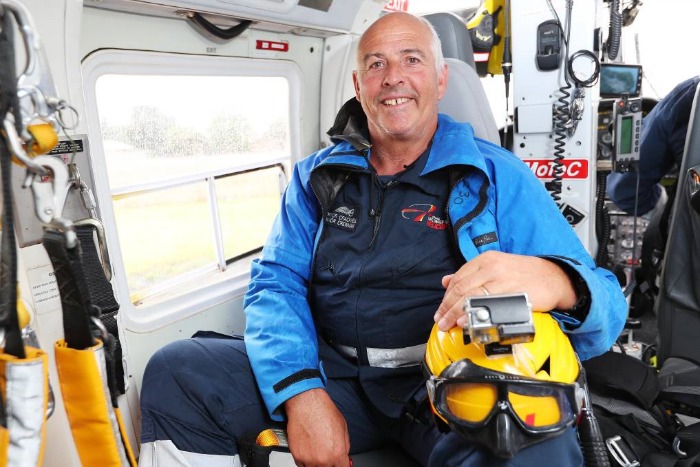
Planning a fun-filled beach day with the whole family is a key part of an Aussie summer, with endless beaches and sea to explore.
But it can carry its dangers too, and now an expert has given his top safety tips to ensure you and your loved ones don’t come to any harm – both in the water, and on land.
Trevor Cracknell, 58, has worked for the Westpac Life Saver Rescue Helicopter team for 32 years, and witnessed happy outcomes of rescues, as well as tragic casualties. His extensive knowledge of the Australian coastline means he’s well equipped to offer advice to families of all ages on the dangers at sea and in the Bush, as well as ways to ensure their safety.
“I’ve never doubted the choice [to become a life saver],” he told Starts at 60. “There have been rescues where people may not have made it, but as a rule, on all the bigger jobs I’ve done, there’s never been that time I’ve thought ‘no, that’s not something I want to do’. Looking after the community is the most important thing, we’re there to look after them. It’s a really good feeling. All our crew have that same mindset.”

He says the main thing to consider, especially when on the beach or near the sea, is preventing a rescue attempt having to occur. Ensuring the beach is patrolled by life guards is essential so that there’s help at hand should something happen, and there’s professionals there to watch you at all times.
“Swim between the flags,” he added. “Make sure you’re not there after hours and it’s always patrolled. For parents and grandparents, just like in a swimming pool or your garden, never take your eyes of those kids. Although it’s patrolled, you’ve got to know where they are at all times. We know the lifeguards can do the rescues, but you are there to help prevent that happening.
Read more: The survival facts that could save your life or someone else’s one day
“If we didn’t have these flags up and patrols organized, the drowning rates on our beaches would be horrendous.”
However, while prevention is key, it’s not always possible, and should something happen, Cracknell urged people not to try and rescue a loved one themselves – unless you’re “a legend swimmer or a lifeguard and know you have the necessary strength”.
The key safety tip is to inform a professional such as a life guard straight away, so they can act fast. They have the expertise and the equipment on hand, should someone need medical attention.
An important message about how you see Starts at 60 on Facebook
“How many times have we seen someone jump in, and the person they were rescuing makes it back to the beach, but they perish,” he added.
He explained it’s essential to always tell people where you’re going, and if you’re on your own, alert a lifeguard to where you’ll be swimming. On the flip-side, if you believe you can attempt a rescue yourself, always call 000 first to tell someone where you are, so you know you have back-up on the way should you come into trouble.
While Australia’s beaches are beautiful, they can be deadly too – and a common problem swimmers face is riptides. If you’re caught in one, Cracknell said the best rule to follow is to “conserve energy” and try to wave for help.
While stronger body surfers may be able to swim back over the bank, he said the old rule of “swimming with the tide and across it” is no longer as important as conserving energy and letting the tide take you – as long as you can alert someone on shore.
Read more: An inspirational story of survival, rescue and what came after…
He said: “Stay still, concentrate on waving for help, you will be drawn out to sea but then you will be rescued.”
The Westpac team don’t just rescue people in danger in the sea though, and many may need help in the mountains or in the Bush. If that’s the case, he warns families and adults to always tell someone where they will be, should they need help.
In addition, many mountain regions such as Katoomba offer hikers emergency locator beacons, and they don’t cost anything. “If you’re two days in and someone falls, you can set that off and you’ll have a rescue helicopter there reasonably quickly,” Cracknell said.
If in doubt, call 000 and the police will organize the necessary rescue assets to help you, quickly and efficiently.
Cracknell has spent his life devoted to saving lives, first through Surf Life Saving, and as a Rescue Crew Officer and Air Crew Officer in Sydney. He has been decorated for Bravery Awards by the Governor General for his heroic efforts and has also represented his country as a swimmer at the 1978 Commonwealth Games in Canada.
Describing his most memorable rescues, he said harsh weather conditions may mean the crew have to make a tough decision on whether it’s safe for them to attempt a rescue. However, it’s very rare that they won’t be able to, and that decision will always be made once they’re on site.
You can now find all our latest news in our News Junkies Club – Australia here.